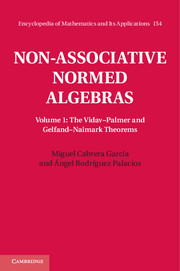4 - Jordan spectral theory
Published online by Cambridge University Press: 05 August 2014
Summary
Involving the Jordan inverse
Introduction In Subsection 4.1.1, we introduce the notion of a Jordan-invertible (in short J-invertible) element of a unital Jordan algebra, as well as that of the J-inverse of such an element. As we notice in §4.1.1, these notions generalize the classical ones of an invertible element and of the inverse of such an element in a unital alternative algebra A (cf. Definition 2.5.23), when A is seen as a Jordan algebra by passing to Asym. By considering the J-spectrum linked in the obvious way to the notion of a J-invertible element, we develop a spectral theory for normed unital Jordan algebras in parallel to that developed in the associative case (cf. Subsection 1.1.1). It is worth emphasizing the Jordan variant of Corollary 1.1.38 given by Theorem 4.1.10, as well as the Gelfand–Beurling formula stated in Theorem 4.1.17. We conclude the subsection by proving a wide non-associative generalization of Rickart's dense-range-homomorphism theorem in Theorem 4.1.19. Indeed, dense-range algebra homomorphisms from complete normed algebras to complete normed Jordan-admissible strongly semisimple algebras are automatically continuous (compare Theorem 3.6.7).
In Subsection 4.1.2, we introduce the notion of a topological J-divisor of zero in a normed Jordan algebra, noticing in Proposition 4.1.23 that this notion generalizes that of a one-sided topological divisor of zero in a normed alternative algebra A (cf. Definition 1.1.87), when A is seen as a normed Jordan algebra by passing to Asym.
- Type
- Chapter
- Information
- Non-Associative Normed Algebras , pp. 450 - 670Publisher: Cambridge University PressPrint publication year: 2014

